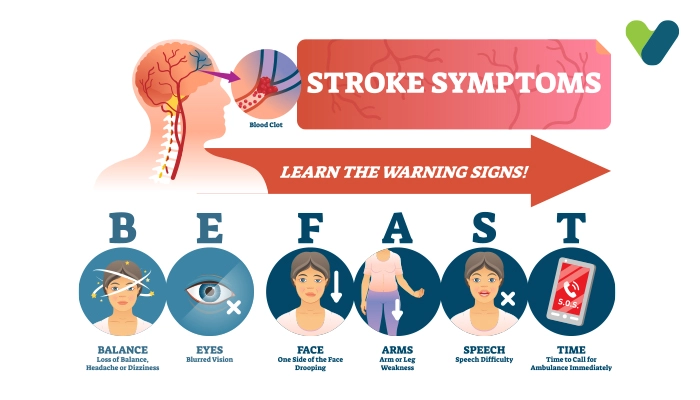Due to high blood pressure, diabetes, and an unhealthy diet. Stefan always knew he could experience a stroke once. But this was just his assumption until he started searching about the cause and symptoms of strokes. Giving your health the priority was understood by him when he read this article.
What is a stroke?
When the blood flow to a region of your brain is blocked or diminished, brain tissue is deprived of oxygen and nutrients, resulting in a stroke. Within minutes, brain cells begin to die. A stroke is a medical emergency that requires immediate attention. Brain injury and other consequences can be avoided if intervention is taken early.The following are signs and symptoms of a stroke:
When you suffer a stroke, the blood supply to your brain is cut off. To avoid brain damage, incapacity, or even death, you must get treatment as soon as possible.Recognizing the signs and symptoms of a stroke allows you to act quickly and potentially save a life—perhaps even your own.
Stroke Symptoms can be: -
- It's difficult to communicate and understand what people are saying. You may be perplexed, slur your words, or have trouble understanding communication.
- One or both eyes have vision problems. You may experience double vision or have blurred or darkened vision in one or both eyes.
- Headache. A sudden, intense headache that is accompanied by vomiting, dizziness, or altered awareness could be a sign of a stroke.
- You may have difficulty walking. You may trip or lose your balance. You may have dizziness or a loss of coordination as well.
- Numbness or paralysis of the face, arm, or leg. Your face, arm, or leg may experience abrupt numbness, weakness, or paralysis. This usually just affects one side of your body. You may also notice that one side of your mouth is drooping.
Physically, what causes strokes?
A blocked artery (ischemic stroke) or a leaking or bursting blood vessel are the two most common causes of stroke (hemorrhagic stroke). A transient ischemic attack (TIA) is a momentary disruption of blood flow to the brain that does not cause long-term symptoms in some persons.Categories
A stroke can occur in one of two different ways: something that limits blood circulation or something that triggers brain hemorrhage.Ischemic stroke: A blood artery carrying blood to the head is clogged in 8 out of 10 strokes. It occurs when fat deposits in vessels split off and migrate to the brain, or when a blood clot develops as a result of inadequate blood flow caused by an erratic heartbeat.
Stroke caused by hemorrhage It's not as prevalent as an ischemic stroke, but it's more dangerous. A narrowing of the arteries vessel in your brain expands up and bursts or a ballooned blood vessel pops. This type of stroke can be caused by unmanaged hypertension or using too many blood-thinning drugs.
Causes
Some of the common causes for strokes are:- The leading cause of strokes is high blood pressure.
- Tobacco. It increases your chances of having a stroke if you smoke or chew it. Nicotine causes an increase in blood pressure.
- Heart illness includes faulty heart valves as well as atrial fibrillation, or an irregular heartbeat, which accounts for a quarter of all strokes in the elderly.
- Diabetes: If you suffer a stroke when your blood sugar levels are high, your brain is more likely to be damaged.
- Medications: Blood-thinning medications, that doctors use to avoid blood clots, can occasionally increase the risk of a stroke by causing bleeding.
- Age. A stroke may affect anybody, even infants in the womb. In general, as you become older, your odds improve. After the age of 55, risks get higher.
- High Cholesterol
What do the signs and symptoms of a ministroke look like?
Because the symptoms of a ministroke and a stroke are so similar, it's nearly difficult to know if you're having one or the other until you've been assessed by a doctor.Both sets of symptoms have one thing in common, they appear out of nowhere.The most prevalent signs and symptoms include
- tingling or numbness in the face, arms, or legs (especially if that numbness is on one side of the body)
- unexpected perplexity
- difficulties in communicating difficulties in comprehending others
- difficulty seeing, difficulty walking, and a lack of balance
- dizziness
- a lack of collaboration
- a strong headache that does not appear to be related to anything
- swallowing problems (dysphagia)
- droopy face
Conclusion:
Acting quickly can assist stroke sufferers in receiving the therapy they require. The most effective stroke therapies are only accessible if the stroke is noticed and identified within three hours of the initial symptoms. If patients do not receive care promptly, they can be in serious trouble.If you've had a stroke or are at risk of having one, you can try to avoid another one by making the following heart-healthy lifestyle changes:
- A cardio diet is one of the most important things you can do for your health.
- Trying to maintain a healthy weight
- Stress management
- Vigorous exercise regularly
- Nicotine cessation
- Keeping track of your blood pressure and cholesterol


